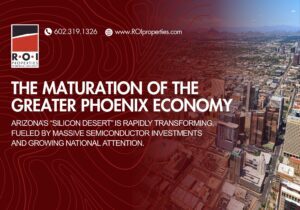After a challenging year in 2020, hotels and retail are experiencing a wave of adaptive re-use in Greater Phoenix and across the country. As of January 2021, Trepp estimated that, on a national basis, hotel prices had fallen 36+% and retail even further at 41+%—so the resulting bankruptcies, non-performing loans, distressed properties, receiverships, and defaults have not come as a surprise. While the Phoenix metro has not seen the depth of distressed real estate assets as in other parts of the country, we are seeing creative investors repurposing well-located hotel and retail properties throughout the Valley—a trend that we are seeing throughout the country as well…
Adaptive Re-Use in Retail
Regional malls offer Main and Main locations, significant square footage and ample parking. Foot traffic, however, is what drives business. In retail, the challenging times have driven a wide range of clever solutions in neighborhood shopping centers and regional malls, such as adding multifamily properties with lifestyle centers, office uses, or using vacant stores for competitive video gaming (a.k.a., esports), self storage, data centers, and municipal facilities such as libraries and courts. “Medtail,” a hybrid of retail and healthcare, offers particular interest given the nation’s aging demographics. High ceilings and large open spaces make big box stores a good fit for warehouses and fulfillment centers—as seen by Amazon’s strategic moves into those spaces even before the coronavirus hit.
Recent adaptive re-use events in Greater Phoenix include:
- During the first week of March, the property manager of Phoenix’s first indoor shopping mall—now called Christown Spectrum —announced plans to add residences, a hotel, entertainment and high-rise business offices on the 98-acre site.
- The Paradise Valley Mall, which recently received approval from Phoenix City Council to rezone. The lifestyle-oriented redevelopment plan includes a mix of residential and commercial buildings, including apartments, office space, a grocery store, restaurants and retail stores.
- Mullin360’s conversion of a Sam’s Club in Casa Grande to a 27-acre auto park.
Converting Hotels into Apartments and More
Hotels are also seeing a wave of investor interest for rezoning and adaptive re-use of properties. The New York Times recently noted a trend of hotels converting part of their spaces into ghost kitchens.
The concept of converting hotels into apartments, low-income housing or multifamily units is not new—indeed, the legendary Westward Ho in downtown Phoenix made the switch way back in 1980. Economic troubles have led to a new look at the opportunities available in idled hotels and motels.
Long-term-stay hotels are particularly suited to the task of becoming small apartment units, since they have kitchens as well as bathrooms. The side benefit of this trend is the Valley’s need to house more people more affordably. Currently, the vast majority of multifamily product is Class A units, which are unaffordable for a significant segment of the population, so the conversion of limited service or long term stay hospitality spaces into Class B or Class C apartments is a win-win for the housing market as well. Vivo Living, which began converting hotels into apartments in late 2019, recently added three more hotel conversion projects to its national portfolio, including a 130-unit former Ramada Inn in Mesa. Numerous other affordable housing developers are acquiring and converting similar long term stay or limited service hotels into affordable housing units.
Their business model is one that we may see more of going forward: retrofitting older motels with open-air corridors and staircases that big hotel brands view as obsolete—but which are well-located and offer a comparable footprint to many multifamily properties. The challenge for would-be developers is that it’s not just as simple as putting a new sign out front and signing up renters. It’s essential to have the city planner on board with code changes, for example.
We anticipate seeing further distressed assets in hospitality and retail asset classes, which ultimately may encourage an uptick in transaction activity once prices reach the right level for investors. The pent-up demand for travel and entertainment could prove to be a significant traffic driver to new, innovative concepts.
In the meantime, investors can look at potential receivership opportunities where hotels or retailers are in default—and look for ways to repurpose and breathe new life into those spaces.
R.O.I. Properties specializes in representing investors, owners, lenders and fiduciaries in buying, selling and leasing commercial real estate throughout the Greater Phoenix market and the state of Arizona. Whether you need help investing in distressed properties, or need distressed property services, we are full-service real estate brokers who handle all commercial asset classes. In addition, we serve as Fiduciaries through court appointments as Real Estate Special Commissioner/Special Master and REO broker. To put an expert advocate on your side, contact us at [email protected] or 602-319-1326.
Learn More About Our Full-Service Brokerage Firm
Contact Us










